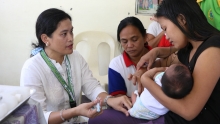Universal Health Care and Maternity Leave in the Philippines

The Universal Health Care Act
According to the World Health Organization:
“The new UHC Act is a critical step towards health for all Filipinos as it will facilitate major reforms to consolidate existing yet fragmented financial flows, increase the fiscal space for benefit delivery, improve the governance and performance of devolved local health systems, and institutionalize support mechanisms such as health technology assessment and health promotion”.
Speaking on this landmark development, the PSI General Secretary Rosa Pavanelli said:
“This success shows how international solidarity can really make a difference for public service workers and citizens. It is even more important as it contributes to ensure the fundamental right to health to the Philippines people. It is an achievement of the Filipinos and for the PSI global campaign on the human right to health”.
She then added that:
“Now we need to make sure that the enforcement of the new legislation does not turn into a gift for private insurance companies, nor create a double system, one for the poor and the other for rich people”.
This requires adequate funding of publicly delivered health services to all, and enhanced participation of the people in the health policy process. The Philippines first step towards health for all was taken fifty years ago with the enactment of the Philippine Medical Care Act. And in 1995, the National Health Insurance Act was passed, setting up the Philippine Health Insurance Corporation (PhilHealth). It had the aim of implementing universal health coverage.
The impact of these earlier legislation was undermined by inequities in access to health services and health status. Instead of health being free for at point of delivery for all, citizens considered to be indigent were merely subsidized. They still had to make out of pocket payments (which they could hardly afford) to access care in private health facilities. Due to this, poor communities have suffered a higher burden of disease, despite PhilHealth’s claim of achieving “universal” health coverage at 86% of the population in 2010.
The new UHC Act opens additional sources of funding for PhilHealth, through taxes, including the “sin tax”. This will enable universal access to free diagnostic services, consultation fees and medical tests.
As the Philippine Department of Health (DOH) and PhilHealth settle down to draft the implementing rules and regulations (IRR) for the Act, we assure them of our support. And we urge them to ensure quality health for all remains at the heart of this historic legislation, in its implementation.
The Expanded Maternity Leave Act
The Expanded Maternity Leave Act is equally a very progressive legislation. It was first approved in the Senate two years ago. It has extended paid maternity leave from 60 days to 105 days. 7 of these 105 days are transferable to the father, at the discretion of the female worker entitled to maternity leave benefits. There is also an option of extending the leave by 30 more days without pay. And employees who are single parents will enjoy 15 more days of fully paid maternity leave added to the 105 days.
The law further ensures that maternity leave shall be granted to female workers in every instance of pregnancy or miscarriage regardless of frequency.
Implementation of the EML will go a long way in promoting women rights as human rights in the world of work, as well as improving maternal and child health outcomes. Gender equality is an important part of our work as PSI. We thus welcome the law, wholeheartedly.
We share the view of Senator Risa Hontiveros, a friend of PSI who has been at the fore of advocacy for the passage of the bill over the last few years, that:
“The signing into law of the Expanded Maternity Leave Act is a moment mothers, families, and children will not only remember, but a victory generations of Filipinos will reap the benefits of for the rest of their lives.”

